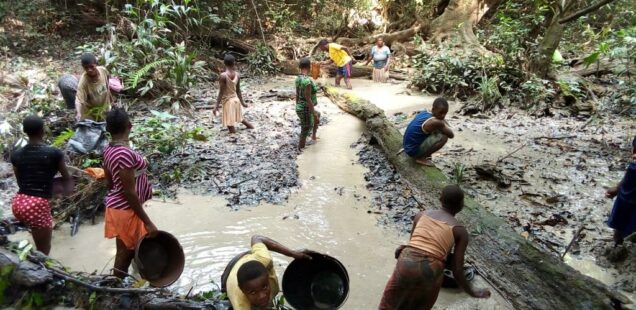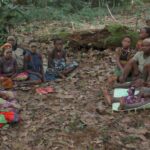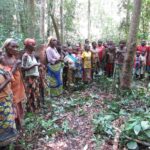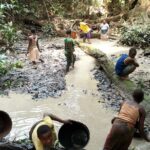
Four communities in Central African Republic strengthen their solidarity and social cohesion by consolidating their links with the territory of life they share and seek to defend more effectively against external threats
This initiative aims to strengthen social cohesion and solidarity between four communities in the north-east of the Dzanga-Sangha National Park in the Central African Republic. The villages of Beya, Belémboké, Panzi and Sced are located in the Sangha-M’baéré prefecture and in the Nola and Salo Commune, in the south-west of the Central African Republic and to the north of the Dzanga-Ndoki National Park. The villages are all inhabited by indigenous BaAka residents and Bogongo and Gbanou residents. The four communities have been living side by side for a long time, sharing the same forests and rivers on which they depend for their subsistence/self-sufficiency and health. This close interaction has defined the communities’ cultural values and shaped their social organisation, generating their ‘traditional knowledge’ about the environment and a deep understanding of how ecosystems work.
However, the arrival and establishment of logging companies in the area has rapidly degraded the forest and attracted many job seekers from across the region. This situation, exacerbated by the arrival of mining companies, has contributed significantly to the impoverishment of the area and the creation of inter-community conflicts, curbing traditional practices and disrupting traditional solidarity and social harmony. For this initiative, the Feyerabend Foundation is collaborating with the Ndima-Kali association— which brings together young indigenous BaAka people from the area— to facilitate a local initiative following the self-reinforcement methodology proposed by the APAC Consortium. Ndima-Kali will help the communities of the four villages to map and document their ‘shared territory of life’, so that they have a better understanding and appreciation of it. This will also promote their self-awareness as ‘custodians’ of the territory and strengthen them in the face of increasing external aggression.
During the first year of the initiative, the four communities will follow parallel processes but will also have at least two important joint meetings in which representatives of the four communities will share the results of their inventories, jointly generate and approve the map of their ‘territory of life’, consolidate the broad outlines of the rules for the use of different types of natural resources (e.g. fish, hunting, roots, wood, etc.) and agree on a common monitoring system. This will also include an agreed conflict management system among the four communities, which will come into play as necessary. The management of intra- and inter-community conflicts using reaffirmed traditional and solidarity-based methods is intended to facilitate knowledge, appreciation and defence of the local cultural heritage. Copies of the map of the territory of life, clearly indicating the rules of use to be followed, and of the monitoring and conflict management system will be posted in the four villages and shared with the forestry and mining operators.
With co-financing sought from other partners, the Ndima-Kali association also hopes to support food self-sufficiency for the four communities by improving their agricultural production, giving priority to non-commercial hunting and increasing the harvesting of non-timber forest products for commercial use. It also wants to lead communities towards more sustainable management of forest and fishery biodiversity by better-documented traditional methods and reduced exploitation of resources through better enforcement of the use rules.






